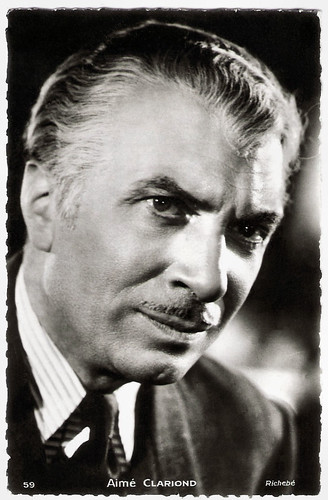
French postcard by Edition E.C., Paris, no. 59. Photo: Roger Richebé.
Great power in his performance
Aimé Clariond’s career was a-typical in the sense that he never entered the Conservatoire despite three attempts. He was born as Aimée Marius Clariond in Périgueux in the Dordogne in 1894. His parents were both actors and infected him with the stage virus. At the age of two years, he already had a part in the play 'Le Bossu'(The Hunchback).
Officially he started his stage career in 1921 at the Théâtre de l'Odéon. There he interpreted the classics, before joining the troupe of André Antoine in 1926 and afterwards that of Lugné-Poë at the Théâtre de l'Œuvre. In 1936 he was engaged as ‘Pensionnaire’ at the Comédie-Française when the government of the Front Populaire appointed Édouard Bourdet as general administrator. In 1937, one year after his engagement, he was appointed ‘sociétaire’ and remained at the Comédie-Française until his death in 1959.
In the mid-1930s he met actress Renée Simonot, Pensionnaire of the Théâtre de l'Odéon, with whom he had a daughter in 1937, but the couple separated soon after. In her second marriage, Simonot would become the mother of Francoise Dorléac and Catherine Deneuve.
Clariond was an actor with great power in his performance, a slightly veiled voice, thus giving life to both characters little known to the big audiences as well as to characters from the classic repertory, such as Alceste in 'The Misanthropist' by Molière, Othello in Shakespeare’s play, Marc Anthony in André Gide’s adaptation 'Antoine et Cléopâtre', directed by Jean-Louis Barrault, or 'Le Carrosse du Saint-Sacrement' by Prosper Mérimée, with Maria Casarès.
He was also memorable in modern repertory such as 'Le Soulier de satin' by Paul Claudel, 'Asmodée'and 'Les Mal-Aimés' by François Mauriac, and 'Port-Royal' by Montherlant (alternating the lead with his comrade Jean Debucourt). Between 1946 and 1950 he also directed various plays, mainly at the Théâtre des Celestins.
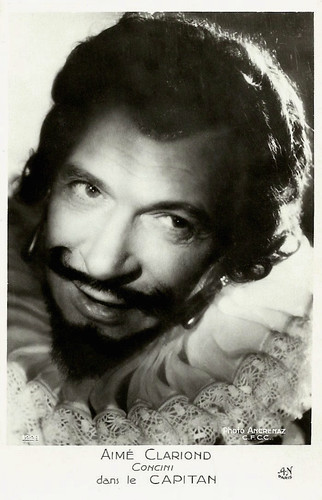
French postcard by A.N., Paris, no. 1229. Photo: Ancrenaz / C.F.C.C. Aimé Clariond as Concini in Le capitan (Robert Vernay, 1946).
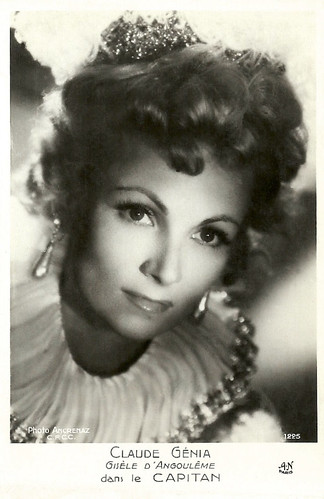
French postcard by A.N., Paris, no. 1225. Photo: Ancrenaz / C.F.C.C. Claude Génia played Gisèle d'Angoulême in Le capitan (1946).
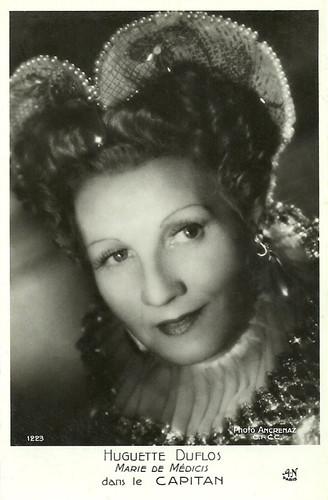
French postcard by A.N., Paris, no. 1223. Photo: Ancrenaz / C.F.C.C. Huguette Duflos played Maria de Medici in Le capitan (1946).
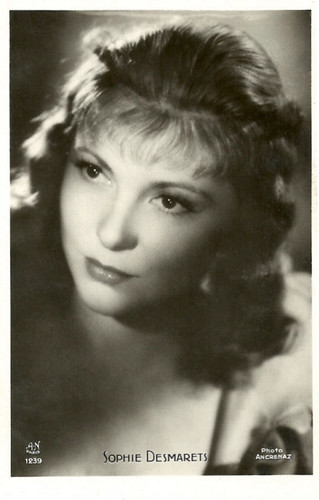
French postcard by A.N., Paris, no. 1239. Photo: Ancrenaz. Sophie Desmarets played Marion Delorme in Le capitan (1946).
Le capitan
Parallel to his stage career, Aimé Clariond developed a very prolific career in the French cinema. He made his debut as Ivan Karamazoff in Les Frères Karamazoff/The Brothers Karamazov (Fyodor Otsep, 1931) with Anna Sten. Soon he was discovered for his refined performances and his perfect diction.
At first, he played mainly in comedies, later on, he specialised in historical dramas. He played Niccolò Machiavelli in the box office hit Lucrèce Borgia/Lucrezia Borgia (Abel Gance, 1935) featuring Edwige Feuillère.
Then followed parts in La route impériale/The Imperial Road (Marcel L’Herbier, 1935), La mensonge de Nina Petrovna/The Lie of Nina Petrovna (Victor Tourjansky, 1937) starring Isa Miranda, La Marseillaise/The Marseillaise (Jean Renoir, 1938), Entente cordiale/Warm Agreement (Marcel L’Herbier, 1939) and De Mayerling à Sarajevo/From Mayerling to Sarajevo (Max Ophüls, 1940) with Edwige Feuillère. During the war years, Clariond was highly active and starred in such films as Mam’zelle Bonaparte (Maurice Tourneur, 1942) and Le Comte de Monte Christo/The Count of Monte Cristo (Robert Vernay, 1942), starring Pierre Richard-Willm.
He smoothly continued his career after the liberation. He was very successful in the adventure film Le capitan/The Captain (Robert Vernay, 1946) and would later appear in other films by Robert Vernay, such as Fantômas contre Fantômas/Fantomas Against Fantomas (Robert Vernay, 1949). He also worked three times with Sacha Guitry: Si Versailles m’était conté/Affairs in Versailles (Sacha Guitry, 1953), Napoléon (Sacha Guitry, 1954) and Si Paris nous était conté/If Paris Were Told to Us (Sacha Guitry, 1955).
His last part was in Une fille pour l’été/A Lover for the Summer (Edouard Molinaro, 1960) starring Pascale Petit. The film was released after Clariond’s death. Aimé Clariond died on 31 December 1959 at Neuilly-sur-Seine, France, according to Wikipedia and CinéArtistes. IMDb writes that he died a day later on 1 January 1960. He was 65.

French postcard by Editions P.I., no. 147. Photo: Pathé Cinema.
Sources: Simon Benattar-Bourgeay (CinéArtistes - French), Wikipedia (French), and IMDb.
This post was last updated on 27 September 2023.
1 comment:
Post a Comment